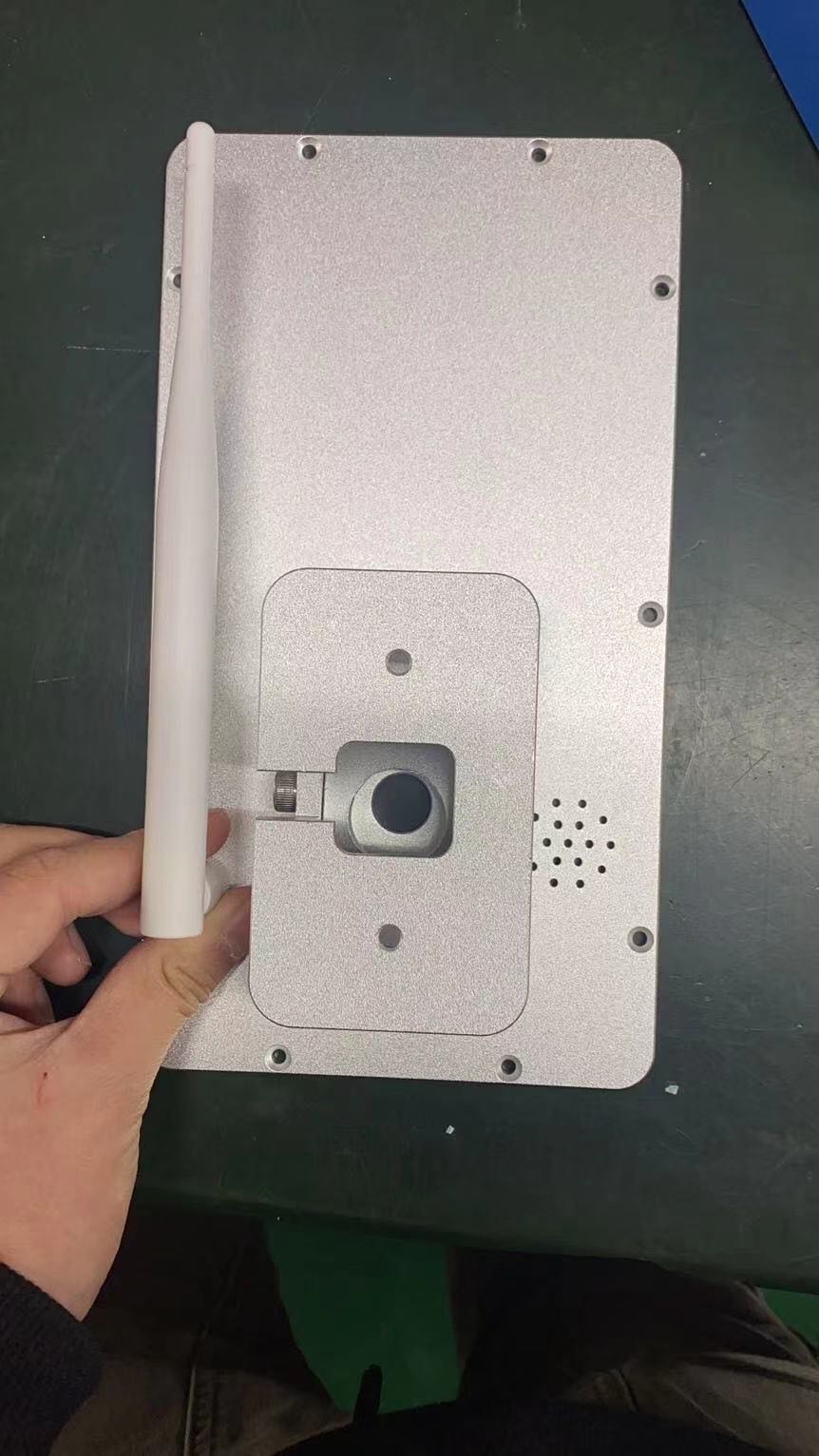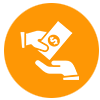I attempted utilizing Alexa and good house gadgets to assist repair my irregular routine – and it modified my life
Ever because the pandemic, when so many individuals have been cooped up, out of labor or in any other case left to their very own gadgets, I’ve heard one phrase mentioned greater than ever: routine.
Routine has lengthy been a brick within the basis of a “functioning society”, nevertheless it crumbled when the scaffolding of strict working hours, commutes and leisure actions corresponding to gymnasium attendance have been eliminated. For a lot of, the gradual return to work and reopening of public areas was sufficient to reestablish normalcy – however others have struggled, and I rely myself amongst them.
Now, I’m all for residing life unconventionally, and I’m positive there’s a model of me who freelances or is a bohemian making artwork for a residing – however this model very a lot likes her job and the construction of a 9-5.
After all, it will be no enjoyable to simply do it the old school approach. That’s why I’ve got down to use Alexa to information me via automating a few of the finest good house gadgets and finest Alexa audio system to assist me construct some semblance of normalcy in my day-to-day life. And guess what? It’s had an actual affect.
Wish to comply with together with me? Take a look at our information for arrange an Alexa Routine or watch the video under to be taught extra about how automating good house gadgets on Alexa works.

Watch On
Routinely vital…
I’m a late-bloomer neurodivergent, and with out a strong routine, my life is a endless gyre of chaos till I attain a boiling level, accomplish all the things without delay, and burn out for one more two weeks, thus returning to chaos. I’m not alone, with a current YouGov survey discovering that 19% of People determine as neurodivergent, and the UK’s Nationwide Well being Service (NHS) estimating a comparable statistic of 1 in seven folks (roughly 14%) being neurodivergent within the UK.
Nevertheless, it’s not an completely neurodiverse drawback. Varied disabilities, psychological and persistent well being circumstances can impede one’s capability to construct – and follow – routines, as can residing circumstances corresponding to shift work, a school life-style or parenthood. Based on Adobe’s State of Work 2023 report, greater than half of US staff (59%) discover it harder to keep up a optimistic work-life steadiness or keep on high of rising workloads, whereas a survey carried out by Acuity coaching discovered that lower than 1 in 5 folks (18%) have a correct time administration system.
Earlier than knuckling down to put out my automations, I spoke with Polly Miskiewicz, a Jungian Artwork Psychotherapist (HCPC, MA) and coach with greater than 10 years of expertise with neurodivergence – each lived {and professional} – to ask for some high suggestions.
The advantages of routine, she explains, are wide-reaching: “Routines regulate our nervous system, particularly for these of us who would possibly expertise heightened sensory or emotional overwhelm.

Polly Miskiewicz
Polly Miskiewicz is a Jungian Artwork Psychotherapist (HCPC, MA) and coach with over 10 years of expertise. She helps self-curious and neurodivergent people rediscover consolation, discover their true selves, and construct happier, extra aligned lives via creativity, play, and somatic practices.
“From a somatic perspective, predictable patterns in our day can calm the physique, ease hyper-vigilance (the always-on feeling), and assist us really feel extra in management.”
For our bodily well being, Miskiewicz explains routine as “a love letter to your physique,” supporting higher sleep, digestion, and power regulation. She continues, “Mentally, routine does a ton of heavy lifting. It reduces the cognitive load, serving to with govt functioning by taking repetitive choices off the desk. It acts as an anchor throughout instances of uncertainty or massive life transitions. Whether or not we’re adjusting to a brand new job, a analysis, or private change, routines present stability and a way of continuity, serving to us navigate what feels unfamiliar.”
It’s not only a box-ticking train both, says Miskiewicz – routines create little wins that construct momentum: “These small habits don’t simply assist regulate feelings within the second; they contribute to long-term psychological well being by fostering (wholesome and maintainable) ranges of resilience and even a way of accomplishment.”

However routinely forgotten…
So, in the event that they’re so vital and so good for us, why achieve this many individuals battle to keep up a routine? Miskiewicz says “From a psychological perspective, routines typically fail as a result of they’re not really ours. They get tousled in societal ‘shoulds’ or the stress to be ultra-productive, leaving us feeling disconnected or unmotivated to ever attempt once more.”
This resistance, she explains, ties into self-determination idea (Deci & Ryan, 1985), which exhibits that motivation thrives once we really feel autonomy, competence, and connection. “If a routine doesn’t align with our values or really feel like one thing we select, it’s a lot tougher (or unimaginable) to keep it up.”
The place attainable, the perfect factor we are able to do to construct a routine in keeping with Miskiewicz is:
- Don’t purpose for perfection: “Enable your self to take a break day or overlook what you have been meant to do.”
- Be aware of your private experiences: “Make selections that align along with your pursuits or already present mechanisms.”
- Deal with micro-routines to start out: “Don’t set your self up for a failure.”
- Consider your emotions: “Routines that resonate emotionally (thanks, Jung!) replicate your true self.”
- Plan instruments not guidelines: “Routines ought to develop with you, not maintain you again.”
- Plan for the physique, not simply the thoughts: “Construct moments of regulation into your day: stretch, breathe, or discover stillness to maintain issues somatically aligned.”
With Miskiewicz’ high suggestions in thoughts, I went forward to plan my good home-assisted day.
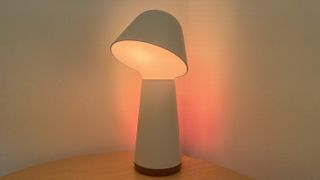
Oh, what a ravishing morning
Miskiewicz advises that your morning routine ought to “set the tone” in your day, suggesting actions like stretching, small duties like making your mattress or a contemporary cup of espresso and having fun with some pure mild (difficult, right here within the UK throughout winter!) to start out you off.
Simple sufficient, and particularly so with my trusty fleet of Alexa-enabled gadgets and different good house devices. Remembering what Miskiewicz had mentioned about beginning small, I targeted on three achievable milestones outdoors of getting myself prepared for the day: get up to extra pure mild, have a cup of tea and clear up small messes.
First up, let’s deal with pure mild; I reviewed the Philips Hue Twilight, a sensible wake-up mild, a couple of months in the past, and it’s been a mainstay in my bed room ever since. It’s Alexa-compatible, however the Philips Hue app affords extra subtle controls, and in the long run I truly used the native app as a substitute of Alexa to arrange my first automation. Discuss failing on the first hurdle.
Regardless, my routine begins at 7:30AM when my Hue Twilight begins steadily rising brightness via to its full Dawn setting at 8AM, which is when Alexa kicks in with its morning routine.
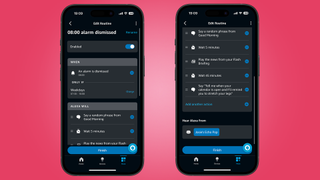
Simply as my alarm goes off at 8AM, my Amazon Echo Spot chimes in with a randomized morning greeting, after which I programmed the ‘Wait’ perform to offer myself 5 minutes to lie in mattress and go via the varied levels of grief following my current awakening. Subsequent up is making myself a cup of tea, for which job I’ve my Swan Alexa Kettle scheduled to kickstart at 8:05AM whereas I hearken to Alexa’s flash information briefing and make my mattress. On Wednesdays and Fridays, Alexa additionally jogs my memory to wash my ground, as a result of it’s robotic vacuum cleaner day.
Then, Alexa waits an extra 50 minutes which, relying on the size of my flash briefing, normally means she pipes up once more across the time I transfer into my workplace. A current research from Yale College exhibits muddle would possibly truly have an effect on productiveness, which Alexa jogs my memory of simply earlier than the workday begins, after which delivers a customized message asking: “Inform me when your calendar is open and I’ll remind you to stretch your legs.”
Thus, my first job of the day after I go online to work is to choose a 20-minute window to stretch and transfer round, which I arrange as a reminder with Alexa earlier than cracking on with my morning.
I am going to take afternoon tea for those who take it with me
Throughout work hours, I shrink back from utilizing Alexa’s Routine function an excessive amount of, as my job can typically chop and alter drastically all through the day. Nevertheless, I do run some less complicated automations that assist transfer the day alongside, or as Miskiewicz describes it, “hold the circulation”.
As an example, as soon as at 11AM and as soon as at 3PM, Alexa will ask me about my temper and if I’ve drunk sufficient water through the day, and can remind me when it’s time for lunch. Miskiewicz encourages recharging creatively because the day goes on by doing issues like dancing or shedding your self in a podcast; simply completed with a fast voice command and my good audio system, too.
There are additionally some automations that don’t come into play every single day, and for good purpose. Miskiewicz warns that “Tech generally is a game-changer for constructing routines, however as a therapist I have to say – it might probably additionally flip into an excessive amount of of a very good factor.
“Ever discovered your self drowning in reminders from 5 completely different apps or caught scrolling between one million productiveness instruments? That’s resolution paralysis in motion, and it’s exhausting. Fixed notifications – prompt overwhelm. And when life will get messy (as a result of it at all times does), lacking an app immediate can depart you feeling such as you’ve failed (you didn’t).”
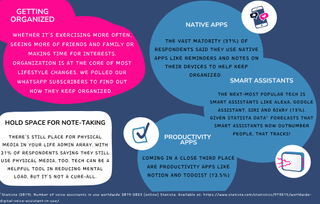
As a substitute, I’ve additionally arrange customized automations triggered by me saying key phrases corresponding to “I’m struggling to focus”, which prompts Alexa to set a Pomodoro timer intermeshed with stress-free music for a five-minute break. That approach, I’m not beholden to aggressive reminders or push notifications, however relatively can dwell in consolation that previous Josie has current Josie’s again, and I’ve the choice to provoke sure constructions all through my day.
Some automations additionally occur solely on particular days to maintain issues a bit extra dynamic; as an illustration, on Wednesdays and Fridays, the robotic vacuum I alluded to earlier cleans up in every single place besides my workplace through the morning whereas I work, after which barges in at 6PM to annoy me out of working too late.
When the night time has come and the land is darkish
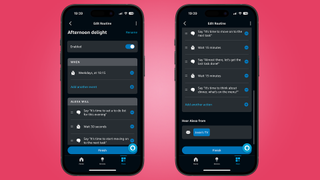
Miskiewicz’ recommendation for the evenings is to “unwind your approach”. So, at 6:15PM, my subsequent Alexa Routine kicks in, with the voice assistant encouraging me to set a to-do listing for the night.
Usually, these are small duties; from wellness rituals like writing in my journal, to working towards Japanese on Duolingo, or simply washing the dishes. The thought is that I can full every of them in roughly 10 minutes and depart room for breaks in-between. In the meantime, Alexa checks in between duties till 7PM, when it’s time to prepare dinner dinner.
Alongside this, all of my Alexa audio system play music from my leisure playlist, and my Philips Hue lights transition to hotter, extra comforting hues, following Miskiewicz’ recommendation to “give your senses a respite.” More and more, there are smaller good gadgets like the good diffuser I attempted final 12 months which may also be automated to assist in giving some sensory reprise – or you may simply go for top-of-the-line good plugs to remotely function completely different followers, audio system and lighting setups.
Because the night attracts to a detailed, the unwinding continues; an hour earlier than my midnight mattress time, my good kettle as soon as once more brews to start my night natural tea ritual, and whereas it steeps I do know it’s time to start out my skincare routine and chill out. My good lights steadily start to dim, and the entire good screens in my house are switched off simply in time for me to prepare for mattress.
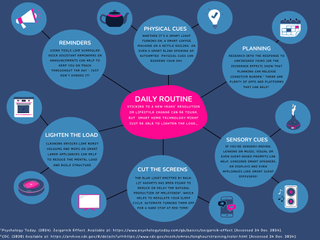
Alexa do not preach, I am in hassle deep
Total, my time spent testing an Alexa-driven routine served its goal after which some; it helped me regulate far more successfully, with the knock-on profit being a marked enchancment in my psychological well being and productiveness. Nevertheless, the most important studying of all was that self-regulation has to, in some unspecified time in the future, take the fore.
Alexa’s Routine perform proved to be massively helpful as I received to grips with my new life-style, and undoubtedly helped hold me on observe for the primary few weeks. Nevertheless, it’s all too simple to go accountability onto an app, a voice assistant, and even one other particular person, and there are some clear drawbacks to relying on know-how to handle your life – a worrying realisation as we creep ever nearer to a actuality the place AI does our considering for us.
As I observed myself changing into much less motivated and engaged with the routine, I slowly began to section out a few of Alexa’s extra forceful interjections, focusing as a substitute on time-based machine automations corresponding to display energy settings, good mild scenes and my tea rituals.
And, wouldn’t you already know it, Miskiewicz’ recommendation aligns completely with my expertise: ”Deliver on the tech! Simply don’t let your tech take over. Stability it out with moments away from screens, as a result of typically a sticky be aware or a doodle on a serviette can work simply in addition to the fanciest app.” Nice information, then, for the seven million notepads I’ve accrued over time.
Whether or not you need to attempt habit-building apps, voice assistants and even smartphone options like iPhone Shortcuts to offer you some tech-assisted construction, right here’s my finest recommendation; go for it, nevertheless it’s a band-aid and never an end-all resolution. Consider it as routine rehab till you’re able to fly solo – or, not less than in my case, good solo.
